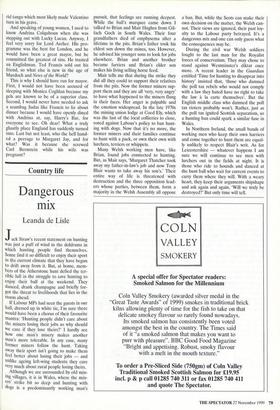Country lite
Dangerous mix
Leanda de Lisle
Jack Straw's recent statement on hunting was just a puff of wind in the doldrums in Which hunting people find themselves. Some find it so difficult to enjoy their sport in the current climate that they have begun to drift away from it. But, at home, mem- bers of the Atherstone hunt defied the ter- rible lull in the struggle to save hunting to enjoy their ball at the weekend. They danced, drank champagne and briefly for- got the threat to livelihoods that lies in the storm ahead.
If Labour MPs had seen the guests in OUT hall, dressed up in white tie, I'm sure there Would have been a chorus of their favourite mantra: 'Hunting people didn't care about the miners losing their jobs so why should we care if they lose theirs?' I hardly see how one man's misery makes another man's more tolerable. In any case, many former miners follow the hunt. - Taking away their sport isn't going to make them feel better about losing their jobs — and unlike ageing left-wing students they care very much about rural people losing theirs.
Although we are surrounded by old min- ing villages, it is in Wales, where the min- ers' strike bit so deep and hunting with dogs is a predominantly working man's pursuit, that feelings are running deepest. While the ball's marquee came down I talked to Brian and Mair Hughes from Gil- fach Goch in South Wales. Their four grandfathers died of emphysema after a lifetime in the pits. Brian's father took his eldest son down the mines, too. However, he advised his younger sons to look for jobs elsewhere. Brian and another brother became farriers and Brian's elder son makes his living selling horse feed.
Mair tells me that during the strike they did all they could to support their relatives from the pits. Now the former miners sup- port them and they are all `very, very angry' to have what happened to the miners flung in their faces. Her anger is palpable and the emotion widespread. In the late 1970s the mining union lodge at Coed Ely, which was the last of the local collieries to close, voted against Labour's policy to ban hunt- ing with dogs. Now that it's no more, the former miners and their families continue to hunt with a pack, or own their own with lurchers, terriers or whippets.
Many Welsh working men have, like Brian, found jobs connected to hunting. But, as Mair says, `Margaret Thatcher took away my father-in-law's job and now Tony Blair wants to take away his son's.' Their entire way of life is threatened with destruction and the three opposition lead- ers whose parties, between them, form a majority in the Welsh Assembly all oppose a ban. But, while the Scots can make their own decision on the matter, the Welsh can- not. Their views are ignored, their past loy- alty to the Labour party betrayed. It's a dangerous mix and one can only guess what the consequences may be.
During the civil war Welsh soldiers fought to the last man for the Royalist forces of conservatism. They may chose to stand against Westminster's diktat once more. A recent leader in the Guardian entitled `Time for hunting to disappear into history' insisted that, 'those who damned the poll tax rebels who would not comply with a law they hated have no right to take the law a Is carte themselves'. But the English middle class who damned the poll tax rioters probably won't. Rather, just as the poll tax ignited Scottish separatism, so a hunting ban could spark a similar fuse in Wales.
In Northern Ireland, the small bands of working men who keep their own harriers and come together to hunt them are equal- ly unlikely to respect Blair's writ. As for Leicestershire — whatever happens I am sure we will continue to see men with lurchers out in the • fields at night. It is those who ride to hounds and danced at the hunt ball who wait for current events to carry them where they will. With a weary heart, they keep their arguments shipshape and ask again and again, `Will we truly be destroyed?' But only time will tell.


























































































 Previous page
Previous page